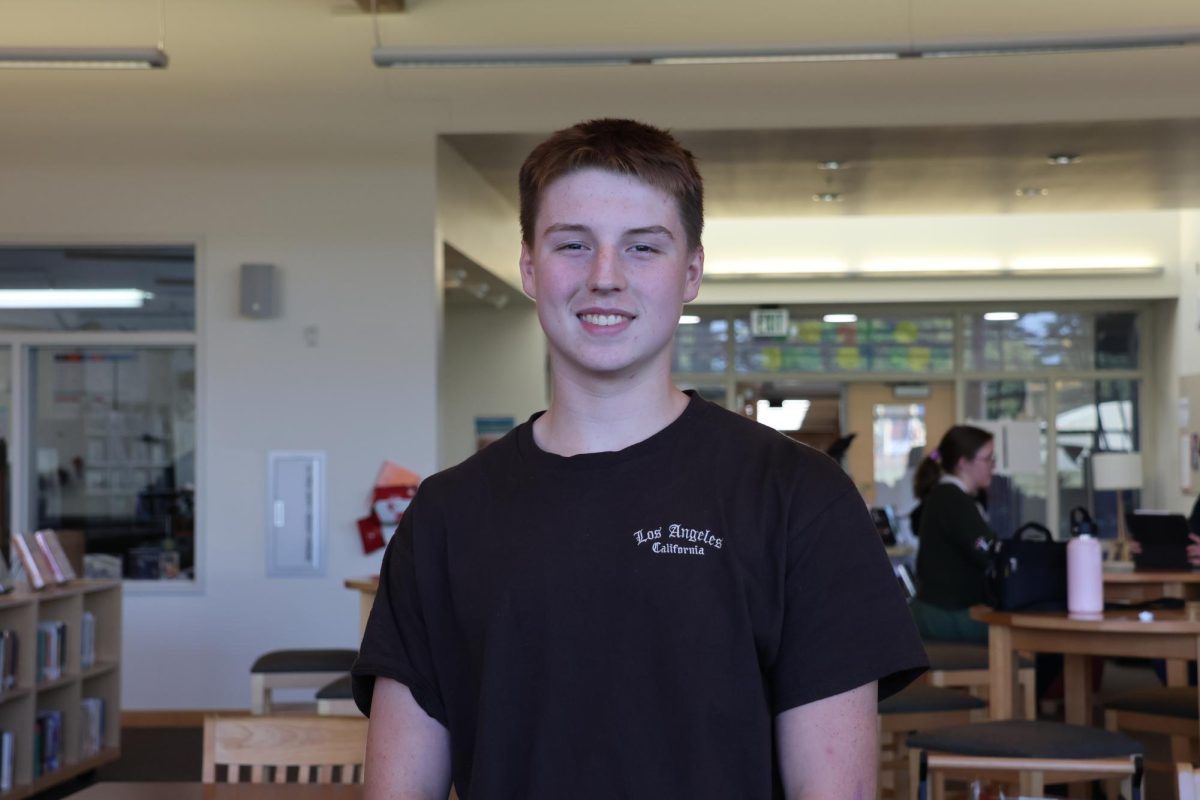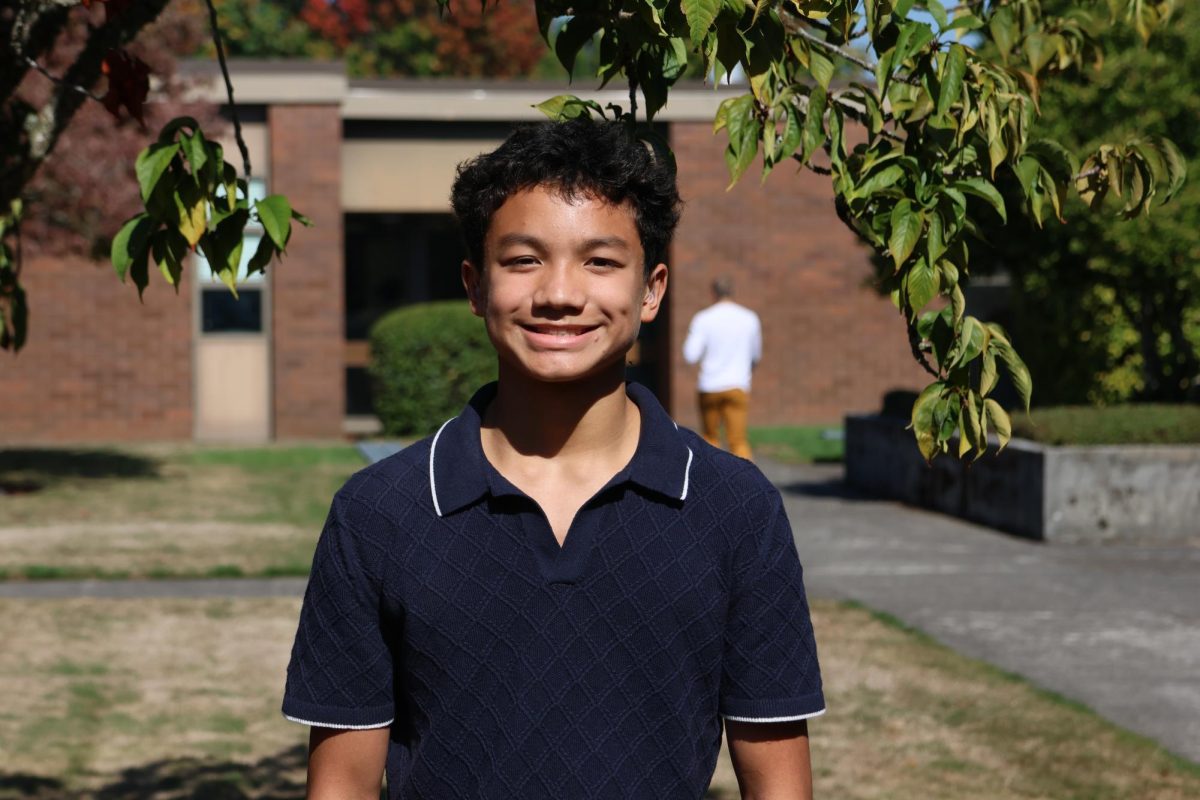La Salle’s World Language teachers are passionate about teaching their students what they need to know about the language itself, as well as the culture that comes with it. The language department teachers love their jobs and the relationships with each other that they’ve developed throughout the years. The Falconer interviewed these teachers to gain insight into these classes, which are ordered by language below.
Español:
La Salle’s Spanish teachers are a tight-knit group as they work together to help each other with everything inside and outside of the classroom. Their common goal is to teach their students about the Spanish language, culture, and geography. They not only want their students to learn as much as they possibly can, but also enjoy doing so in their classes.
Ms. Gantt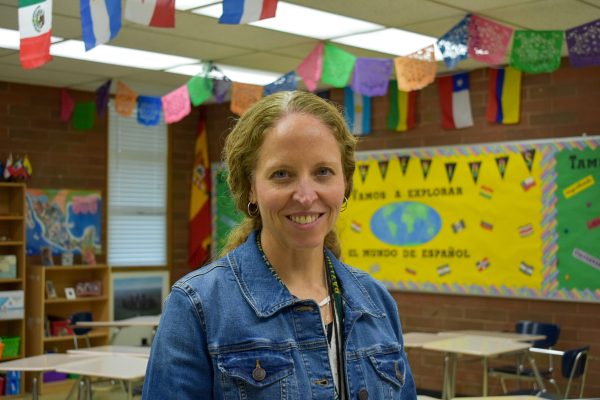
Ms. Amy Gantt, Spanish I and Honors Spanish III teacher, enjoys teaching Spanish I because the students are newer to the language and she likes the “freshness” of it. She also enjoys teaching Honors Spanish III because her students are taking their skills to a greater depth throughout that course.
Ms. Gantt assigns daily homework that should take students between fifteen and twenty minutes with an occasional longer assignment every once in a while. Her homework usually focuses on the skills they are learning in class, such as vocabulary and grammar tenses. “Sometimes it’s reading an article talking about a cultural topic that we do,” she said.
Ms. Gantt’s Spanish I students enjoy putting together slideshows describing their family. According to Ms. Gantt, her Honors Spanish III students enjoy creating a video of themselves making a dish in their cooking unit. They also like doing an oral presentation regarding their favorite movie. “They may not like the oral presentation, but they do like the thinking about their movie,” Ms. Gantt said.
For some fun entertainment, as well as comprehension, Ms. Gantt’s Honors Spanish III classes watch a few movies throughout the year, which “puts their Spanish to the test as their understanding of what’s being said,” she said.
While there are some less difficult aspects of speaking a foreign language, it can also be very challenging. In her opinion, Ms. Gantt’s students “struggle with always wanting to get it right,” she said. She wants her students to be okay with making mistakes because they can learn from that and grow as Spanish speakers.
In class, Ms. Gantt’s students occasionally practice listening to conversations in Spanish to prepare them for the listening portion of their test at the end of the chapter.
According to Ms. Gantt, vocabulary is one of the more simple things for her students to learn. She sees that grammar is more difficult for her students because they’re also learning English grammar at the same time. Ms. Gantt uses her own experience with learning Spanish to help her students. “My English grammar solidified itself as a result of learning Spanish grammar because I had to analyze my first language in addition to learning my second language,” she said. “That does tend to be the part that people struggle with and the fact that it doesn’t always line up.”
The easiest part of teaching Spanish for Ms. Gantt is that she loves to teach. The hardest part is giving her students “as authentic of an experience as possible,” she said, because most students’ second language education ends in high school. “The rest of their world is in English,” she said.
Ms. Gantt thinks that the best way for students to extend their learning is by taking class trips and being surrounded by the culture and language that they’ve been learning about for however long. “It’s just hard to create that within a world where they get this and then they go to a math class or then they go to English class,” she said.
Prior to this year, the Spanish classes have taken trips to places such as Puerto Rico and Costa Rica. Their next trip is in the summer of 2025. They’ll be taking a trip to Northern Spain for about nine to eleven days. They’ll go to different cities including “Barcelona, Bilbao, and Pamplona,” Ms. Gantt said.
Ms. Gantt and her fellow World Language teachers hold their students to high standards, but at the same time care for their overall well-being. They want to challenge their students to be the best they can be and at the same time support their students however they can.
Ms. Gantt enjoys the collaboration between her and her colleagues. “It’s such a strong team,” she said. “I’ve grown so much in my teaching and as a person since I’ve been here.”
Ms. Kessler
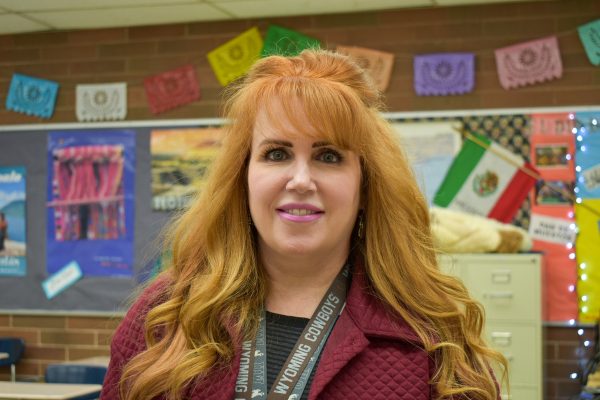
Ms. Karen Kessler, Spanish I and II teacher, loves to teach all her classes. She enjoys the “excitement” of Spanish I and the next step that Spanish II students are taking with their knowledge of language.
Most days, Ms. Kessler gives her students shorter homework assignments that are meant to take about ten to fifteen minutes. “I’m not a fan of burying kids in work,” she said. “I’m more a fan of practicing so they feel competent.” Spanish I homework usually focuses on memorizing vocabulary and how to apply it to sentences, and from there, how to form paragraphs.
Ms. Kessler’s students enjoy the family presentations in Spanish I “because it’s about themselves,” she said. Her students also like talking about the Day of the Dead, or Dia de Los Muertos, because they also have the opportunity to do the prayer service. Ms. Kessler’s Spanish II students are intrigued while learning about “Guatemala and some atrocities that happened there,” she said. Ms. Kessler also teaches her students about “pancake verbs” and makes pancakes for them.
Ms. Kessler has her students listen to speakers from different Spanish speaking countries, including Spain, Puerto Rico, and Colombia. She tries to have her students have three listening activities per chapter to prepare them for a big summative assessment at the end of a semester.
Ms. Kessler thinks that the pressure that students put on themselves for good grades is what they struggle with the most. “There’s a thing called an effective filter,” she said. “And when they’re stressed out, they can’t take in information.” To help her students ease into things, Ms. Kessler likes to share stories from when she was learning Spanish. She tells them what mistakes she made and how she worked with and learned from them.
The most difficult part about teaching for Ms. Kessler and fellow Spanish teacher Ms. Lisa Moran is trying to keep their students engaged for 85 minutes straight. “We change activities every five to seven minutes,” she said.
Ms. Kessler thinks that La Salle’s language department is different from other schools because the teachers here work on making sure their students create a strong understanding of the language through all aspects: “speaking, reading, listening, and writing; all of it,” she said.
Ms. Kessler appreciates how the language teachers cover each other and help each other out. “It’s the best department I’ve ever worked for in my thirty years of teaching,” she said.
Though there is little she wishes the department could do differently, Ms. Kessler would like to be able to offer some sort of “film studies” or “literature” class for students.
Ms. Moran
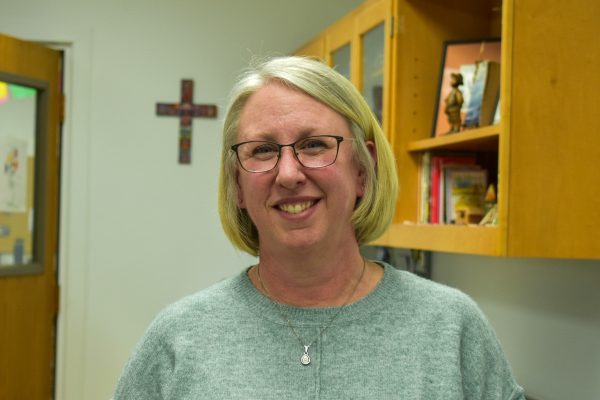
Ms. Moran, Spanish II, Honors Spanish IV, and AP Spanish V teacher, appreciates all of her classes for different reasons. She loves her Honors Spanish IV classes because their cultural topic revolves around Spain, which is where Ms. Moran, herself, traveled abroad. Honors Spanish IV students take everything they’ve learned and put it all together, which is something that she takes pride in teaching.
There is a daily homework assignment for Ms. Moran’s students. They should only take about ten to fifteen minutes, “so they have that little bit of outside practice,” Ms. Moran said. All Spanish students are also required to get about five speaking points or “Puntos” every week for a participation grade.
Ms. Moran’s Spanish II students enjoy the legends and myths project that they do “because they read a legend and then they have to retell it,” Ms. Moran said. Her AP Spanish V students unfortunately don’t get to do many projects because their focus is “task-based,” but they enjoy vocab games.
Similar to Ms. Kessler, Ms. Moran finds that students struggle with the idea of “perfectionism” when it comes to speaking. “They’re afraid to not reach that level of perfection,” she said.
Ms. Moran’s Honors Spanish IV and AP Spanish V students listen to more “authentic” videos that are more cultural or related to the current topic they’re covering at the time. Occasionally, Ms. Moran’s students are asked to do some listening practice as homework where they write questions according to what they heard or to make a comparison to something else.
Ms. Moran sees that remembering vocabulary from year to year is the most difficult part for her students. “Sometimes I think students get overwhelmed by just the amount that they want to learn in a year,” she said. Ms. Moran thinks that “formulaic” grammar, which means it follows a certain pattern or formula, is the easiest part for a student.
Ms. Moran loves the support that the language teachers share with each other. “We support each other too, both personally and professionally with whatever’s going on,” she said.
Ms. Moran wishes to take a trip to Germany, France, and Spain, including all the teachers and their students. She also wishes that there were more German classes, so she, as well as the other teachers, could see Mr. Lane every day because he only works three days a week in a five-day week.
Francais:
Ms. Barker

Ms. Amanda Barker is the only French teacher at La Salle. She teaches French I, French II, Honors French III, and Honors French IV.
Ms. Barker enjoys teaching French II because her students do “a lot of creative projects,” she said. She loves the different units she teaches in French II, especially the Paris unit. Ms. Barker loves to teach her Honors French III students about the different “content and culture.” She likes to talk about the “castles, medieval France, and art,” Ms. Barker said.
Ms. Barker’s students are assigned homework almost every day, though they get lots of time in class to “work together and ask me questions,” she said.
Students in Ms. Barker’s French I classes tend to enjoy a restaurant project that they do because “I encourage everybody to be silly with it,” she said. Honors French III students like the art project that they do where they chose a French-speaking artist or an artist who had an influence on France and get to present the person of their choosing as well as some of their art.
Ms. Barker’s students are required to get 20 speaking points, or 25 for extra credit, most months. Her students in each level are in a constant competition to get the most speaking points and whoever does, gets the chance to have an automatic 100% on a homework assignment or extra bonus points added to an assessment.
Ms. Barker has noticed that students struggle with the fear of making mistakes when it comes to speaking. She thinks that students are holding themselves back if they’re too afraid to mess up. “I try to create a community in our classroom where we all get comfortable with each other; where students get comfortable with each other so that they’re not as scared of looking silly in front of other people,” Ms. Barker said.
French students often do listening practice in Ms. Barker’s class. They watch “authentic videos of real French speakers speaking French,” she said.
Ms. Barker believes that the easiest part of learning French for her students is when they are asked to do assignments where a portion of it is already done for them. On the other hand, she believes that using their own creativity is the most difficult part for the students. She also finds that writing in French tends to be pretty difficult for her students as well.
The most difficult part of teaching French for Ms. Barker is trying to fill up 85 minutes of class time “because I don’t want to be loading them with information from bell to bell,” she said.
Ms. Barker is taking her French students on a trip to France in the summer of 2024 who have had at least two years of French by the time of the trip. The trip will last for about nine days and will be a tour of northern France.
Ms. Barker thinks that she and her fellow language teachers work very well together. “Even though I don’t teach the same language as anybody else, I know that I can go to the other language teachers if I need ideas or if I need advice,” she said. Ms. Barker also feels like all of the language teachers equally work hard rather than one feeling like they do more.
Ms. Barker sees that she and her colleagues all share the common interest of the languages and cultures that they teach, but the way they go about teaching their students is different because they all have different styles of teaching.
Ms. Barker loves the department, but she does wish there was another French teacher.
Deutsch:
Mr. Lane
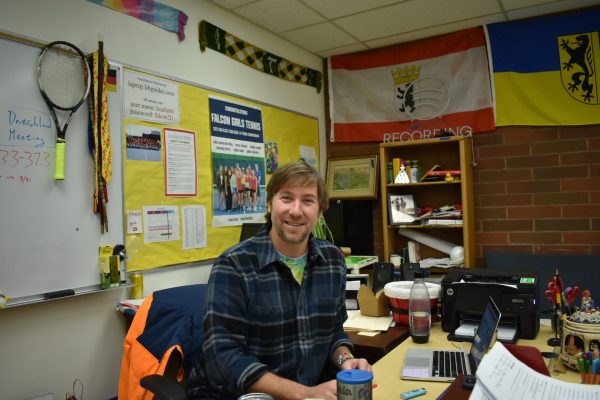
Mr. David Lane, La Salle’s only German teacher, teaches German I, German II, and a “hybrid class of German III and IV Honors,” he said.
Mr. Lane enjoys walking his German I students through the process of high school, as well as “how to get organized, how to learn to study, how to take notes, [and] how to properly learn a foreign language,” he said. Mr. Lane enjoys helping his German II students how to balance their classes and extracurricular activities. Mr. Lane also enjoys his Honors German III and IV class because it’s “really rewarding to see them take the foundation that we just spent two or three years laying to kind of get the basic vocab and basic grammar down for German and see them build on that to the point where they can start communicating in a ninety minute class only in the target language,” he said.
Mr. Lane’s Honors German III and Honors German IV students don’t have daily homework, but have either a daily quiz or worksheet that goes over vocabulary or grammar. Homework in German I and German II looks like studying for their daily quiz, which “usually covers eight to ten vocabulary words or very elementary grammatical concepts for German,” Mr. Lane said.
German II students enjoy a project that they do where they get into groups and create a skit of a scenario at a restaurant. This scenario includes a waiter and two customers who order food, but they notice an issue with their food and they have to resolve the problem with the waiter using only German. In Honors German III and IV, students like doing a project where they do research to come up with their own invention. “We had some great ones like a shower curtain that you could put your hands through to wash your dog and that you don’t get wet while washing your dog,” Mr. Lane said. “Which I thought was brilliant.”
Mr. Lane and his German II, Honors German III, and Honors German IV students are going on a trip to Germany during spring break of 2024. On this ten to eleven day trip, they’re planning on going to many different places including Berlin, Dresden, Munich, and “some smaller quintessential German towns,” Mr. Lane said.
All German students start off the semester with one hundred participation points, and during classes if they are caught not paying attention or not participating as much as they should, they lose points. “Every time that we are in German mode and they aren’t speaking German, they lose two points off their participation grade,” Mr. Lane said.
Mr. Lane thinks that staying organized and daily quizzes are the most difficult things for German I students, but at the same time the easiest part because he gives them all the tools they need to succeed and it’s completely up to them on how they decide to use these tools. For German II students, Mr. Lane sees that speaking in German for longer periods of time is difficult. “For German III and IV, it’s just understanding all those sixteen versions of the word ‘the’,” Mr. Lane said.
Mr. Lane’s goal for his students by the end of their time at La Salle is to have them be able to place into a higher level German class if they chose to continue their German studies. He wants them to be able to read an article and “they don’t necessarily need to understand everything that’s going on, but they need to be able to get the gist of what an article is about,” Mr. Lane said.
“Our schedule is definitely the most difficult part [about teaching German],” Mr. Lane said. He finds his students’ attention spans tend to not last the whole 85 minutes of a single class period, but he tries to keep them engaged. He also doesn’t like how if students are to miss one block period, they’re missing about half of the information they’re meant to learn in a week. As well as during the spring, Mr. Lane occasionally misses classes due to tennis, and those two factors at times can create issues with keeping everyone on the same page.
With La Salle being the seventh school he’s taught at — two teaching English in Germany and five teaching German. Mr. Lane has “never worked with a more cohesive and enthusiastic foreign language department,” he said. Mr. Lane loves how passionate his colleagues are about what they teach and how they all love their students.




